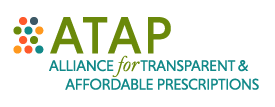ATAP Press Release: Supreme Court Sides with Patients, Physicians, & Pharmacists
FOR IMMEDIATE RELEASE
December 10, 2020
CONTACT
Dan Rene of kglobal 202-329-8357 or daniel.rene@kglobal.com
SUPREME COURT SIDES WITH PATIENTS, PHYSICIANS, & PHARMACISTS
8-0 Decision Patient Supports State Rights to Regulate PBM Industry
[Washington, DC] [December 10, 2020] – The pharmacy benefit manager (PBM) industry suffered a resounding defeat at the United States Supreme Court today in Rutledge vs Pharmaceutical Care Management Association (PCMA). In a unanimous 8-0 decision, the Justices agreed that states have the rights to impose regulations on PBMs.
The Alliance for Transparent and Affordable Prescriptions (ATAP), a coalition of patient and provider groups concerned about the role PBMs (middleman in between pharmacies and insurance companies and patients and physicians) play in the rising cost of drugs and reduced patient access to affordable treatment, filed an Amicus Brief with the United States Supreme Court supporting the Plaintiffs. ATAP’s Amicus Brief argues in part that PBMs are engaged in abusive practices with serious practical and policy consequences – including upward pressure on prescription drug pricing.
ATAP’s brief states, in part that, “…PBMs operate differently in practice. While PBMs are indeed successful in extracting discounts and other price concessions, PBMs do not pass along the bulk of these concessions to patients or plans, instead retaining much of those savings for themselves as profits. They construct formularies (lists of covered drugs) to give preferential treatment to manufacturers who pay the highest rebates, administrative fees, and other price concessions based on a percentage of the list price of a drug. Much of these fees are again diverted to the PBMs’ own bottom line, rather than defraying the costs of care…”
The brief further states, “…profit driven activities distort the healthcare market to the detriment of those PBMs are intended to serve, are riddled with conflicts of interest, and limit patient access to drugs to maximize PBMs’ own profit potential, even where formulary decisions depart from accepted clinical standards or medical necessity. And PBMs avoid scrutiny by resisting transparency and threatening to raise premiums if the status quo is threatened, which makes it difficult for those in the industry to correct PBMs’ abuse of market power…”
The full brief, prepared by Daniel Geyser of Geyser PC on behalf of the ATAP member organizations may be found HERE.
“In a political climate that seems completely divided at times, we are grateful to see that there are still unifying policy issues transcending politics,” Dr. Robert Levin, ATAP’s President stated. “Every day, we witness first-hand how the PBM industry drives up costs and interferes with patient access to the medications they need. We appreciate the contributions of so many patient advocacy organizations that helped illustrate the critical need of regulating this rogue industry.”
ATAP has been an active advocate for patients in a variety of federal and state battles to amplify the voices of patients and physicians.
“The Supreme Court sees, like we all do, that patients are suffering under a system preventing them from obtaining medicine they need – at prices they can afford, said Dr. Michael Schweitz of the Coalition of State Rheumatology Organizations, an ATAP member organization. “The PBM industry profits significantly off rebates while interrupting the provider-patient relationship, solely to increase its own profits.”
“The Supreme Court is now amplifying the light we are shining on the previously hidden profit motives of the PBM industry,” said Dr. Angus Worthing of the American College of Rheumatology, an ATAP member organization. “With this decision and other actions in Washington and various states, patients, physicians, and policy makers now have the power to effect meaningful change.”
ATAP is working in many states to force the PBM industry to disclose rebate data and encourage transparency and reporting requirements for all entities involved in the prescription drug supply chain – PBMs, insurers, and manufacturers.
###
For more information, or to schedule an interview with an ATAP spokesperson please contact Dan Rene at 202-329-8357.
Please visit http://www.atapadvocates.com
